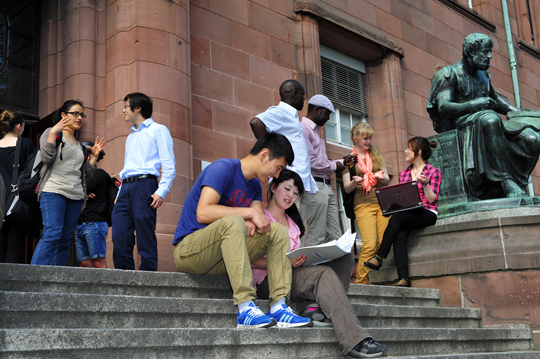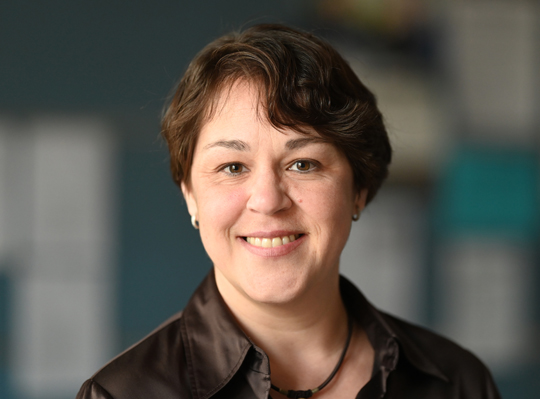Increasing critical thinking
Freiburg, Mar 18, 2019
For three years now, Prof. Dr. Manuela Boatcă has taught at the Institute of Sociology at the University of Freiburg. For Boatcă, who took her degree in English studies and German studies in Bucharest, Romania, before studying sociology in Germany and gaining her PhD at the Catholic University of Eichstätt-Ingolstadt, teaching means both being aware of one’s own power when conveying knowledge, and learning from the students. Annette Hoffmann spoke to her about an altered conception of sociology, knowledge production and political engagement.
 International and interdisciplinary: five universities participate in the Global Studies Programme. Photo: Thomas Kunz
International and interdisciplinary: five universities participate in the Global Studies Programme. Photo: Thomas Kunz
Ms. Boatcă, you lead the “Global Studies Programme” at the University of Freiburg, this is designed to be not only interdisciplinary but also international with the involvement of four partner universities. Is the program a concession to globalization or a commentary and presentation of globalization?
Manuela Boatcă: It isn’t a concession to globalization, it’s a reminder of how it came about in the first place: that is, not as a project of the Global North, but through processes that started several hundred years ago. These include for example the transatlantic slave trade, migration and capital flows, as well as the major churches. All this initially reshaped the Global South and then had repercussions for the present-day society of the North. In the 20th century, the Global North also noticed that the world is global. You can only find the global and historic connections if you look for them. If you ask why the West is central, successful and developed, you get answers about the West, its development and its centrality.
In your lecture at the “Dear White People” conference that took place in February 2019 at the E-Werk, you spoke about the sociologist Max Weber and his racist descriptions of Poland. Does sociology constantly have to evolve because its field of research, society, changes?
Yes, but Max Weber is not an ideal example of how the prevailing Zeitgeist has changed. Even in his day, Max Weber represented a very clear nationalistic position; at the same time he was an admirer of W.E.B. Du Bois, who is now seen in American sociology as the founder of another critical sociology. The question is, who is deemed to be definitive for the subject. Voices that are critical and have less power are usually not heard.
You’ve often emphasized that biographies shape research. That wasn’t an issue in academia for a long time, because the category of academics was homogenous, i.e. old, male, white, mostly coming from the educated middle-class. Does academia have to become more honest here?
It not only has to be more honest, it needs to think more horizontally about subjectivity, because all knowledge is subjective. Paradoxically, Max Weber emphasized this, but he isn’t usually taught in this way. We’ve known at least since the development of feminist theories that the point of view of a researcher is important and every issue reflects certain interests.
 “We will obtain increasingly complex pictures in sociology, and not neatly defined tables and charts,” emphasizes Manuela Boatcă. Photo: Patrick Seeger
“We will obtain increasingly complex pictures in sociology, and not neatly defined tables and charts,” emphasizes Manuela Boatcă. Photo: Patrick Seeger
Does this new diversity of voices, that also reflect democratic processes, mean that sociology can no longer make universal statements?
It cannot be our goal to make universal statements. Our task is to better understand what’s going on. The problem is that simple outlines are attractive. But if the result of this reduction is a poor sociological analysis, then this attraction cannot replace the validity of analysis. We will obtain increasingly complex pictures in sociology, and not neatly defined tables and charts.
Does complexity reduce the risk of being co-opted by politics?
Sadly not. The fact that knowledge comes from a particular social class, ethnic group or specific period is no guarantee that it is democratic. Knowledge from below is not democratic or emancipatory knowledge per se.
Do you think there is a connection between identity politics and populism?
The problem isn’t diversity but clinging to privileges that you feel are threatened by diversity. In his keynote speech at “Dear White People”, the American racism researcher Ibram X. Kendi stressed that you shouldn’t ask yourself what you lose when society becomes more diverse, but what you get from it when the burden of responsibility is shared by many.
What is the relationship between academia and political actionism?
It’s not antithetical, at least. We have to be aware that as academics in Germany we are in a powerful position. Naturally we also represent political positions. The more transparent we make this, the easier it is for students to handle it. For me, political activism is part of scholarship. This was something I had to learn too, I was taught differently.

